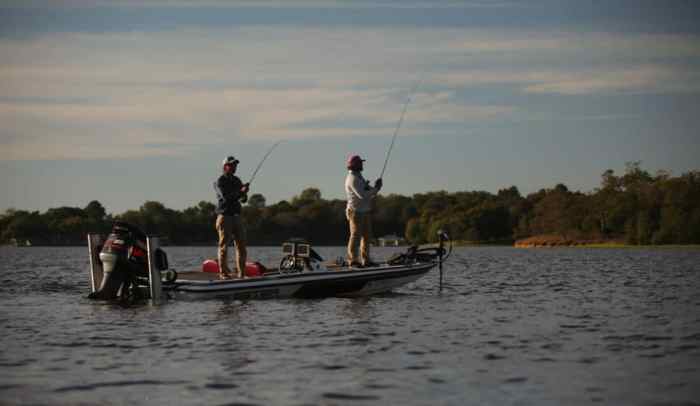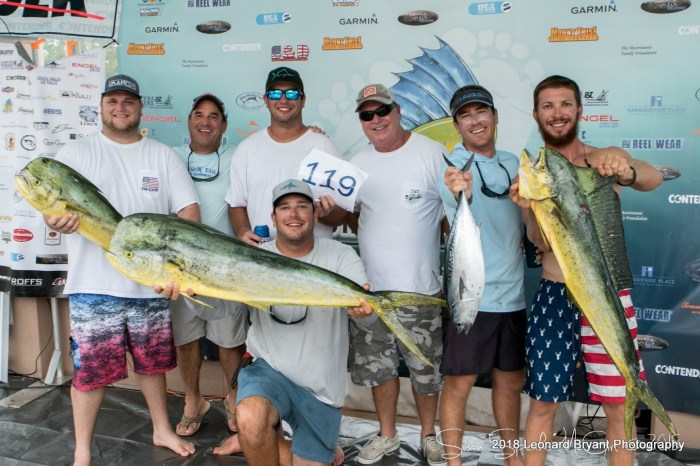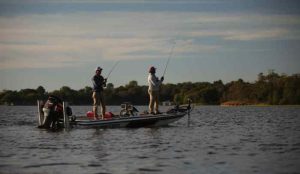
Embark on a journey through the exciting world of fishing competitions and tournaments, where anglers showcase their skills and camaraderie in various settings. From freshwater to ice fishing, explore the diverse landscape of competitive angling that captivates enthusiasts worldwide.
Introduction to Fishing Competitions and Tournaments
Fishing competitions and tournaments are organized events where anglers compete to catch the largest or most fish within a specified time frame. These events bring together fishing enthusiasts from around the world to showcase their skills, sportsmanship, and love for the sport.The popularity of fishing tournaments has been steadily increasing, with more participants joining each year. This growth can be attributed to the thrill of competition, the camaraderie among anglers, and the opportunity to win prizes and recognition.
Additionally, fishing tournaments promote conservation efforts and sustainable fishing practices, raising awareness about the importance of preserving aquatic ecosystems.
Types of Fishing Tournaments
- Freshwater Tournaments: These competitions take place in inland bodies of water such as lakes, rivers, and reservoirs. Anglers target a variety of freshwater species like bass, trout, and catfish.
- Saltwater Tournaments: Held in coastal areas and open seas, saltwater tournaments focus on species like marlin, tuna, and swordfish. Anglers test their skills against the challenges of the ocean.
- Fly Fishing Tournaments: In these events, participants use specialized fly fishing techniques to catch trout, salmon, and other freshwater species. Fly fishing tournaments require precision and finesse.
- Ice Fishing Tournaments: Taking place in frozen lakes and rivers during the winter months, ice fishing tournaments challenge anglers to adapt their strategies to the cold conditions. Participants drill holes in the ice and fish from shelters to stay warm.
Benefits and Challenges of Fishing Competitions
Fishing competitions offer a range of benefits for participants, including opportunities for skill improvement and fostering camaraderie among anglers. However, anglers also face challenges such as intense competition and dealing with changing environmental conditions. Furthermore, fishing tournaments play a significant role in conservation efforts and fish population management.
Benefits for Participants
- Enhanced Skills: Competing in fishing tournaments can help anglers improve their fishing skills, including techniques for different species and environments.
- Camaraderie: Participating in competitions allows anglers to connect with like-minded individuals who share a passion for fishing, fostering friendships and a sense of community.
- Learning Opportunities: Fishing tournaments provide a platform for anglers to learn from each other, exchange tips and tricks, and gain insights into new fishing techniques.
Challenges Faced by Anglers
- Intense Competition: The competitive nature of fishing tournaments can create pressure on anglers to perform their best, leading to heightened stress and anxiety.
- Changing Environmental Conditions: Anglers must adapt to varying environmental factors such as weather changes, water conditions, and fish behavior, which can pose challenges during competitions.
- Time Commitment: Participating in fishing competitions requires a significant time investment for preparation, travel, and actual competition days, which can be challenging for anglers with other commitments.
Contribution to Conservation Efforts
- Research and Data Collection: Fishing tournaments often contribute valuable data to fisheries management agencies, helping to monitor fish populations, track species distribution, and gather information for conservation efforts.
- Education and Awareness: Tournaments provide a platform to educate anglers and the general public about sustainable fishing practices, conservation initiatives, and the importance of protecting aquatic ecosystems.
- Supporting Sustainable Fisheries: By promoting catch and release practices, implementing size and bag limits, and supporting habitat restoration projects, fishing competitions play a role in ensuring the long-term sustainability of fish populations.
Preparation and Strategy for Fishing Competitions
Preparation and strategy play a crucial role in fishing competitions, determining success on the water. Anglers need to carefully plan and strategize to increase their chances of landing the winning catch.
Gear Selection and Practice Routines
Before the competition, it’s essential to ensure that you have the right gear for the job. Choose your rods, reels, lines, and lures based on the target species and fishing conditions. Practice using your gear to familiarize yourself with its performance and optimize your technique.
Importance of Strategy Development
Developing a solid strategy is key to adapting to changing conditions during the competition. Consider factors such as weather patterns, water temperature, current flow, and fish behavior to determine the best approach. Having a flexible strategy allows you to adjust quickly and improve your chances of success.
Mental Aspects of Competitive Fishing
The mental game is just as important as the physical aspect in fishing competitions. Stay focused on your goals and avoid distractions on the water. Visualize success, maintain a positive mindset, and manage stress effectively to perform at your best during tournaments.
Notable Fishing Competitions and Tournaments

Fishing competitions and tournaments are held all around the world, attracting anglers of all levels to showcase their skills and compete for prestigious titles. Let’s take a look at some of the most famous fishing tournaments and competitions that have gained widespread recognition.
Bassmaster Classic
The Bassmaster Classic is considered the “Super Bowl of Bass Fishing” and is one of the most prestigious tournaments in the fishing world. Anglers compete for the chance to win cash prizes and the coveted title of Bassmaster Classic champion. The tournament has a rich history and continues to draw top anglers from around the globe.
International Game Fish Association World Championship
The International Game Fish Association World Championship is another highly esteemed fishing competition that brings together anglers from different countries to compete in various categories. Anglers showcase their skills in catching different species of fish, aiming to set new world records and earn recognition for their achievements.
Unique and Unconventional Fishing Competitions
In recent years, there has been a rise in unique and unconventional fishing competitions that have captured the attention of anglers and spectators alike. Events like the World Carp Classic, where anglers target massive carp in a team-based competition, or the Extreme Kayak Fishing Tournament, where anglers battle rough waters to land big catches, have gained popularity for their thrilling and challenging nature.
Cultural Significance of Fishing Competitions
Fishing competitions hold a significant cultural value in different regions and communities around the world. In places like Japan, traditional fishing tournaments like the Tsuri Gyoretsu are celebrated as a way to honor local fishing traditions and bring communities together. These events showcase the importance of fishing as not just a sport, but also a cultural heritage that is passed down through generations.
Sustainable Fishing Practices in Competitions
Sustainable fishing practices play a crucial role in ensuring the longevity of fish populations and the health of aquatic ecosystems, especially in the context of fishing competitions and tournaments.
Implementing Catch and Release Policies
- Participants and organizers can promote sustainable fishing by implementing catch and release policies, where fish caught during the competition are released back into the water unharmed.
- By releasing fish back into their natural habitat, it helps in maintaining the population levels and allows them to reproduce, ensuring the sustainability of the fishery.
Using Barbless Hooks
- Using barbless hooks can minimize the damage caused to fish during catch and release, reducing the stress and injuries they may experience.
- Barbless hooks are easier to remove, making the process quicker and less harmful to the fish, increasing their chances of survival after being released.
Promoting Ethical Angling Practices
- Participants and organizers can educate anglers on ethical angling practices, such as proper handling techniques, minimizing handling time, and avoiding unnecessary harm to the fish.
- Respecting size and bag limits set by authorities also contributes to sustainable fishing practices, ensuring that fish populations are not overexploited.
Role of Fishing Competitions in Conservation
- Fishing competitions can serve as platforms to raise awareness about conservation and the importance of sustainable fishing practices among anglers and the general public.
- By showcasing responsible angling behaviors and advocating for the protection of fish stocks, fishing competitions can lead by example and inspire others to follow suit.
Impact of Technology on Fishing Competitions
Technology has significantly influenced fishing tournaments, revolutionizing the way anglers approach competitive fishing. From advanced fishing gear to digital tools for tracking and analyzing catches, technology has brought about both benefits and challenges to the sport.
Advanced Fishing Gear
Advancements in technology have led to the development of high-tech fishing gear, such as sonar fish finders, GPS navigation systems, and advanced fishing rods and reels. These tools provide anglers with a competitive edge by helping them locate fish more efficiently and improve their chances of making a successful catch.
Debate Surrounding Technology
There is an ongoing debate in the fishing community about the use of technology in competitive fishing. Some argue that technology levels the playing field by allowing all anglers access to advanced tools, while others believe that it takes away from the traditional skills and intuition required in the sport.
Future Trends in Technology
Looking ahead, future trends in technology are expected to further shape the landscape of fishing competitions. Innovations such as AI-powered fishing drones, underwater cameras, and real-time tracking systems are likely to become more prevalent, offering anglers new ways to enhance their fishing experience and performance.
Evolution of Fishing Competitions and Tournaments

Fishing competitions and tournaments have come a long way from their traditional roots to the elaborate events we see today. Let’s delve into the evolution of these contests and how they have been shaped over time.
Traditional Angling Contests
Before the modern era of fishing tournaments, traditional angling contests were more informal and focused on showcasing individual angler skills. These contests often took place in local communities and revolved around catching specific species or the largest fish.
Evolution of Rules and Regulations
As fishing competitions gained popularity, the need for standardized rules and regulations became apparent. Organizers started implementing guidelines to ensure fair play, conservation of fish stocks, and the safety of participants. Over time, these rules have become more detailed and complex to address various aspects of the competition.
Formats in Fishing Competitions
The formats of fishing competitions have evolved significantly, moving from simple catch-and-release events to multi-day tournaments with different categories and prizes. Anglers now compete in various disciplines such as fly fishing, bass fishing, and saltwater fishing, each with its own set of rules and challenges.
Influence of Social, Cultural, and Environmental Factors
Social, cultural, and environmental factors have played a significant role in shaping fishing tournaments. Social media and technology have transformed how competitions are organized and promoted, while cultural traditions and values continue to influence the types of contests held. Additionally, growing environmental awareness has led to the promotion of sustainable fishing practices in tournaments to protect marine ecosystems.
Final Thoughts
In conclusion, Fishing Competitions and Tournaments offer not just a platform for showcasing angling prowess but also contribute to conservation efforts and community engagement. With a rich history and promising future, these events continue to shape the landscape of competitive fishing globally.
Expert Answers
How can I prepare for a fishing competition?
Prepare by selecting the right gear, practicing regularly, and developing a strategic approach based on weather and fish behavior.
What are some notable fishing tournaments to look out for?
Keep an eye out for events like the Bassmaster Classic and the International Game Fish Association World Championship, which are renowned worldwide.
Why is sustainable fishing important in competitions?
Sustainable fishing practices ensure the long-term health of fish populations and promote responsible angling among participants and organizers.





